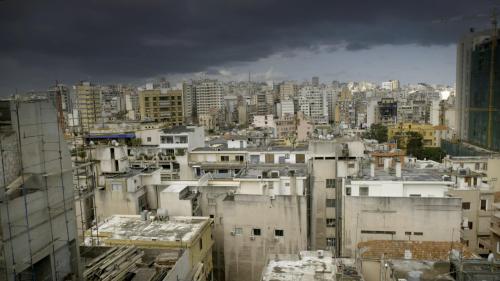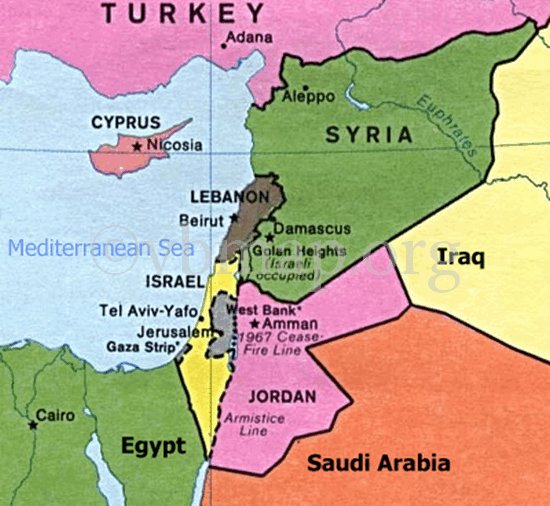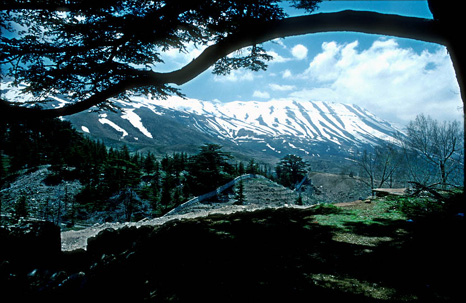In 2006 Anthony
Bourdain traveled to Beirut, Lebanon to tape an episode of his show Anthony Bourdain: No Reservations. The
first part of the show was business as usual, showcasing some of the best
dishes that this international city has to offer. Halfway through their taping,
things drastically changed when the Israel-Lebanon War trapped them in their
hotel and limited their movements. Instead of killing the episode, they
continued taping, documenting the war from their point-of-view of being a
foreigner in a hotel during a war. They eventually got out safe and sound. But
the heightened security was nerve-racking, and the regular staccato gunfire
served as an ominous soundtrack. Skip ahead to last week (11/12/2015), the day
before the infamous attacks on Paris: ISIS suicide bombers attacked the city of
Beirut, killing 43. It was the worst terrorist attack in the city since the Lebanese
Civil War (1975-1990). But news of this attack got lost in the midst of the
Paris attacks.
The origin of the
word Lebanon is stemmed from the Semitic word for white, Ibn. It may have been a reference to the snow-white tops of Mt.
Lebanon, located in the northern region of the country. The country has been
mentioned in the Epic of Gilgamesh, the Hebrew Bible, in papers at the library
at Ebla (one of the early kingdoms in Syria), and in Ancient Egyptian texts.
Lebanon is
surrounded on the north and east by Syria and by Israel on the south. It has a
long western coastline along the Mediterranean Sea. Across the Mediterranean
Sea to the northwest is the island nation of Cyprus (I covered Cyprus a while
back—it’s the island that looks like a narwhal). It's located in an area often referred to as the Levant. Lebanon is divided into four
areas: the coastal areas, the Lebanon Mountain range, the Anti-Lebanon Mountains
(is this some kind of parallel universe? Like matter and anti-matter? Actually,
it refers to the fact that it lies opposite of the Lebanon Range, which lies mostly
in Syria, ironically), and the Beqaa Valley (the country’s major agricultural
lands). Lebanon is known for its forests of cedar trees. In fact, it’s so
important, it’s on their flag. However, these forests are constantly under
threat of forest fire and deforestation. Lebanon is the only Arab country that
doesn’t have a desert or camels. The summers are generally hot while the
winters can be cold, and many areas, especially in the higher elevations,
receive heavy snow.
This land has been
controlled by a myriad of other civilizations and kingdoms throughout history. During
Biblical times, this area was part of Canaan and home to the Canaanites and
their descendents, the Phoenicians who were a seafaring people. The area fell
under Persian rule for nearly two centuries before Alexander the Great took
control. The 4th and 5th centuries brought along a new
change for this area: Maronite Christianity began to spread across the land. And
because of their location between the Roman Empire and the Persian Empire, many
battles were fought here. Muslim Arabs took over Syria a couple of centuries
later, and later on the Druze (a branch of Shia Islam) began to establish a
stronghold in southern Lebanon. There was a lot of tension between the Roman
Christians and the various Muslim groups during the 11th century
onwards. When Anatolia (now most of modern day Turkey) became a Muslim
territory, the Pope was asked to step in for guidance: thus began a series of
battles called The Crusades. There was quite a bit of unrest between the
various Muslim and Christian groups in Lebanon, and in fact, the Druzes killed
about 10,000 Christians during the violence of the mid-19th century.
WWI came and this area became known as Great Lebanon under the French Mandate
of Syria and Lebanon. Many people died of starvation during the war. Largely a
Christian country at the time, France formed the Lebanese Republic in 1926. However,
it wouldn’t be until the end of WWII until Lebanon would fully be an
independent nation. The new Lebanon understood the sensitivity of its religious
diversity, so it came up with this pact: its president is Maronite Christian;
its speaker of parliament is Shiite Muslim; its prime minister is Sunni Muslim;
and its deputy speaker of parliament and deputy prime minister is a Greek
Orthodox. Just after this, Lebanon supported the Arab countries in a war against
Israel. Regional conflicts led to many Palestinians to flee to Lebanon. In
1975, Lebanon would enter its own civil war that would last until 1990.
Christians fought against a combination of PLO, Druze, and other Muslim
militias for nearly 15 years. During the early 1980s, American, French,
Italian, and British forces were deployed to fight against the siege of Beirut.
US and French barracks were bombed by suicide bombers from an Islamic Jihadist
group, resulting in 241 American soldiers killed, 58 French soldiers, and 6
civilians. In 2006, Lebanon entered into a war with Israel ending with far more
Lebanese killed than Israelis. Shortly after this, other insurgent groups from
Syria and nearby areas began operating throughout Lebanon and the general region.
Lebanon has been on the edge of its seat, hoping the Syrian civil war wouldn’t
spill over the border, but last week, it looks like it did.
Beirut, Lebanon’s
largest city and capital city, lies on a peninsula on the Mediterranean Sea,
almost in the middle of its western coastal border. There hasn’t been a census
taken since 1932, but estimates given suggest a population of around a million
people, maybe twice that in the Greater Beirut area. The central district is
one of the most vibrant areas in Lebanon and serves as the center for business,
government, and culture. Some of the world’s best nightclubs and restaurants
are located in Beirut. There are also more than 60 gardens in this area as well.
Despite some shaky political and security issues, Beirut still ranks high on
lists of cities to visit. There are numerous universities, business, and
organizational headquarters located here, modern infrastructure, a number of
world-renowned museums, sports arenas, and media outlets.
The Lebanese
economy fared pretty well during the global economic crisis of 2008. However,
security and political issues in the region stemmed from Syrian Civil War/Arab
States conflicts have a great propensity to weaken their economy. Many Lebanese
have fled the country in the past decade and send back remittances to family
members who are still there. Lebanon does have a large agricultural sector as
well as a large number of skilled workers. Oil has been discovered in the
seabed of the Mediterranean Sea, and Lebanon, Cyprus, Israel, and Egypt are in
talks discussing the best way to move forward. They do rely on tourism, but the
conflicts in Syria have dropped tourism numbers significantly.
Lebanon has a
fairly diverse religious make up. Although Lebanon had a Christian majority at
one time, it now it has a slight Muslim majority, which is about equally
divided between Shia and Sunni. There is still a large Christian population (a
variety of denominations), followed by a smaller number of Jews, Buddhist,
Baha’i, Hindus, and Mormons.
The official
language is Arabic, and the majority of the people speak a variety known as
Lebanese Arabic. There are still a few instances where French is still used,
such as a secondary language of educational instruction. And although France
controlled the country as a mandate during WWI, there are a small number of
people who still speak French in the home. Deaf people in Lebanon learn
Lebanese Sign Language. A growing number of Lebanese youth are ditching Arabic
to French or English who see it as more popular and more advantageous on a
global scale. Smaller pockets of ethnic neighborhoods (mostly Armenian, Greek,
and Kurdish) still speak their native languages.
Because Lebanon
reaches back to Antiquity, the people here have been doing amazing things for
thousands and thousands of years. The first law school in the world was
established in Beirut. It is mentioned numerous times throughout the Bible and
in other ancient texts. The Bible mentions that Jesus performed his first
miracle in Lebanon. The Phoenicians were the ones who built one of the first
ships and many believe they sailed to America long before Christopher Columbus
did. Lebanese people and those in Diaspora have contributed to the arts,
technology, politics, sciences, and other fields. And since I love the food
from this area of the world, I’m very excited about all of this.
Up next: art and
literature








No comments:
Post a Comment